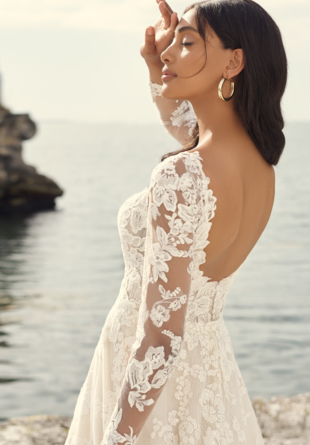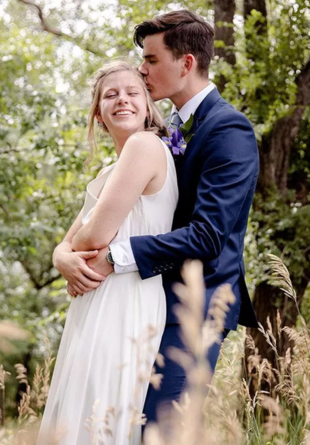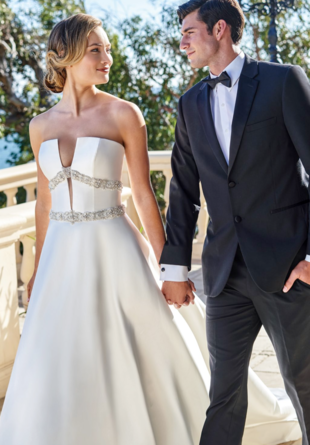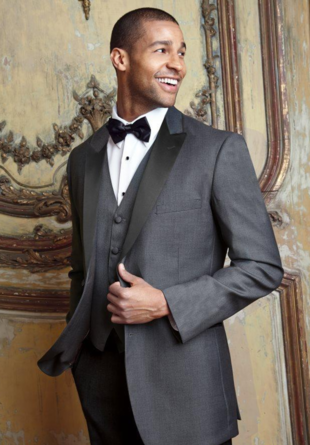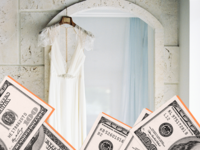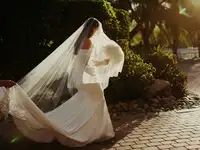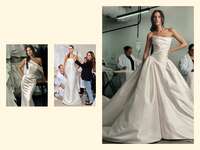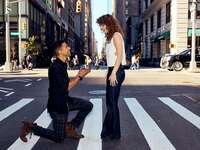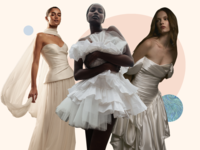25 Must-Ask Wedding Dress Appointment Questions

It's no secret that dress shopping is one of the most exciting parts of wedding planning. I mean, there's even a hit TV show about it. But a wedding dress appointment is nothing like your typical trip to the mall. The process of trying on wedding dresses can be stressful if you don't go into it with a solid plan. Fortunately, there are plenty of ways to prepare.
After gathering wedding dress inspiration, the next step is to familiarize yourself with all the proper questions to ask before, during and after your bridal dress appointment. Having this knowledge upfront can help the process go smoothly. But how do you know what questions to ask at your wedding dress consultation? We're breaking that down here.
Below, you'll find a list of 25 must-ask wedding dress appointment questions. (We've covered everything from wedding dress cost to customizations). You can bookmark this page to have on hand throughout every step of the process. Once you've familiarized yourself with this list, you can start to think about how to book a bridal appointment. (Psst: That's an easy one. All you have to do is head to The Knot Vendor Marketplace and enter your location to browse bridal shops near you.)
Wedding dress appointment questions for: Before | During | After

What to Ask Before the Wedding Dress Appointment
Before attending your very first wedding dress consultation, you'll have a bit of homework. First, familiarize yourself with the different wedding dress designers the salon carries to get an idea of your personal taste. After that, we recommend reading up on what to wear wedding dress shopping. Finally, you should review the questions below to determine what info you still need from your bridal gown consultant.
1. Is there a cost to try on wedding dresses?
Typically, there's no cost to try on wedding dresses. While most bridal salons offer free appointments, we do recommend asking if there are any additional fees you should be aware of, such as a no-show fee. Some salons also offer premium-paid experiences where you can reserve longer appointment times, private spaces and fun add-ons like drinks and snacks for you and your guests. Check out your bridal salon's website or give them a call to find out more information.
Okay, so we've established there's no fee to try on gowns, but do you tip bridal consultants? While it isn't required, it's certainly a thoughtful gesture to tip your bridal gown consultant after the appointment. According to Ou Ma, creative director and founder of the bridal brand OUMA, "tipping a bridal consultant isn't required but is definitely appreciated if you feel they went above and beyond to make your experience special." When in doubt, it never hurts to ask about the salon's specific policy.
2. Does my wedding date affect my wedding dress shopping timeline?
Before you even set foot in the bridal salon, you should be aware of how your wedding date will affect your wedding dress shopping timeline. After you make your purchase, most gowns take four to six months to arrive and require an additional two to three months for alterations. If you're shopping close to your wedding date, you may be limited to last-minute wedding dresses, like samples or off-the-rack gowns (styles that have previously been tried on but can usually be taken home the same day). And while rush deliveries are sometimes available for an additional cost, keep in mind that smaller stores may not be able to place last-minute orders, and designers may not always be able to accommodate your short timeline. It's always good to know your limitations up front.
3. How many people can I bring to my bridal appointment?
While wedding dress shopping alone is becoming increasingly popular, the majority of brides still attend their wedding dress appointments with an entourage. Typically, the group consists of the bride and a few close friends and family members. Because some bridal salons are limited on space, there may be a limit to how many people you can bring. Be sure to ask a representative from the salon about their policy prior to your appointment.
4. Can I request a sample gown if you don't carry it in-store?
Not every bridal designer's entire collection is available in every store. When a designer releases a new wedding dress collection, salon owners pick and choose the styles that they want to sell in their store. They purchase samples of those styles from the designer at wholesale cost and use those dresses for try-ons during bridal appointments. When you find your dress after trying on the sample gowns, the salon places an order for a brand-new version based on your measurements (this is why it can take months for the dress to actually be ready!).
So, why does this matter? If you're looking at a designer's website and see a wedding dress you love, you'll want to find a salon that has the dress in-store for you to try on. If they don't, they may be able to request a sample specifically for you with enough notice.
5. Are any trunk shows coming up?
Unlike traditional wedding dress samples, a trunk show gives you the opportunity to try on a designer's entire collection—including dresses that may not regularly be available in the store. These events also often give you a rare opportunity to talk one-on-one with the dress designer. You can personally discuss the gown you like and any changes you may want to make to it. An added bonus: Most bridal salons will discount your purchase if you buy a gown on the spot during a designer trunk show.
6. What is the typical deposit on a wedding dress?
According to The Knot Real Weddings Study, the average cost of a wedding dress last year was $2,000. While there are options in every price range, you can typically expect to pay a deposit before leaving the bridal salon, regardless of the cost of the dress. The required deposit percentage varies from shop to shop (and the final amount will depend on the price of your chosen dress), so be sure to reach out in advance to ask about their payment plan policies and what to expect when signing your wedding dress contract. By gaining this knowledge upfront, you'll be able to work the cost of the deposit into your overall wedding budget.
7. Are alterations included in the cost of my gown, and what do they average?
Wedding dress alterations are usually not included in the cost of the wedding dress, so it's important to leave some wiggle room for them when creating your wedding dress budget. This is because the cost of wedding dress alterations can vary depending on what you specifically need, but they seem to run anywhere from $700 to $1,000 on average.
8. How many dress fittings can I expect before I can take my dress home?
Most custom gowns require multiple rounds of alterations to get the fit just right. Your first wedding dress fitting typically takes place about two or three months before your wedding day. This is when the seamstress will handle any major alterations, like fixing the length, adjusting straps, sewing the bustle or adding hidden bra cups. Depending on the salon, you may need one or two follow-up fittings. Your final dress fitting should take place about two weeks before your wedding—this gives you the most accurate fit while still leaving time for professional steaming or last-minute changes.

What to Ask During the Wedding Dress Appointment
Trying on wedding dresses is an incredibly exciting experience, but it also comes with a major decision. Use this wedding dress questions checklist to stay calm, cool and collected while chatting with your bridal gown consultant during your wedding dress try-on appointment.
9. What dress styles do you recommend for me?
You might already have an idea of the wedding dress silhouette you want (if not, that's okay too!), but it's important to also be open to your stylist's suggestions. At the start of the appointment, your consultant will ask you about the kind of dress you're looking for, but you can also ask for their recommendations based on your desired aesthetic or wedding theme. Remember: The idea that there's a "best wedding dress for your body type" is a myth. So try on the different silhouettes, fabrics and styles that your stylist suggests; you never know what you might fall in love with.

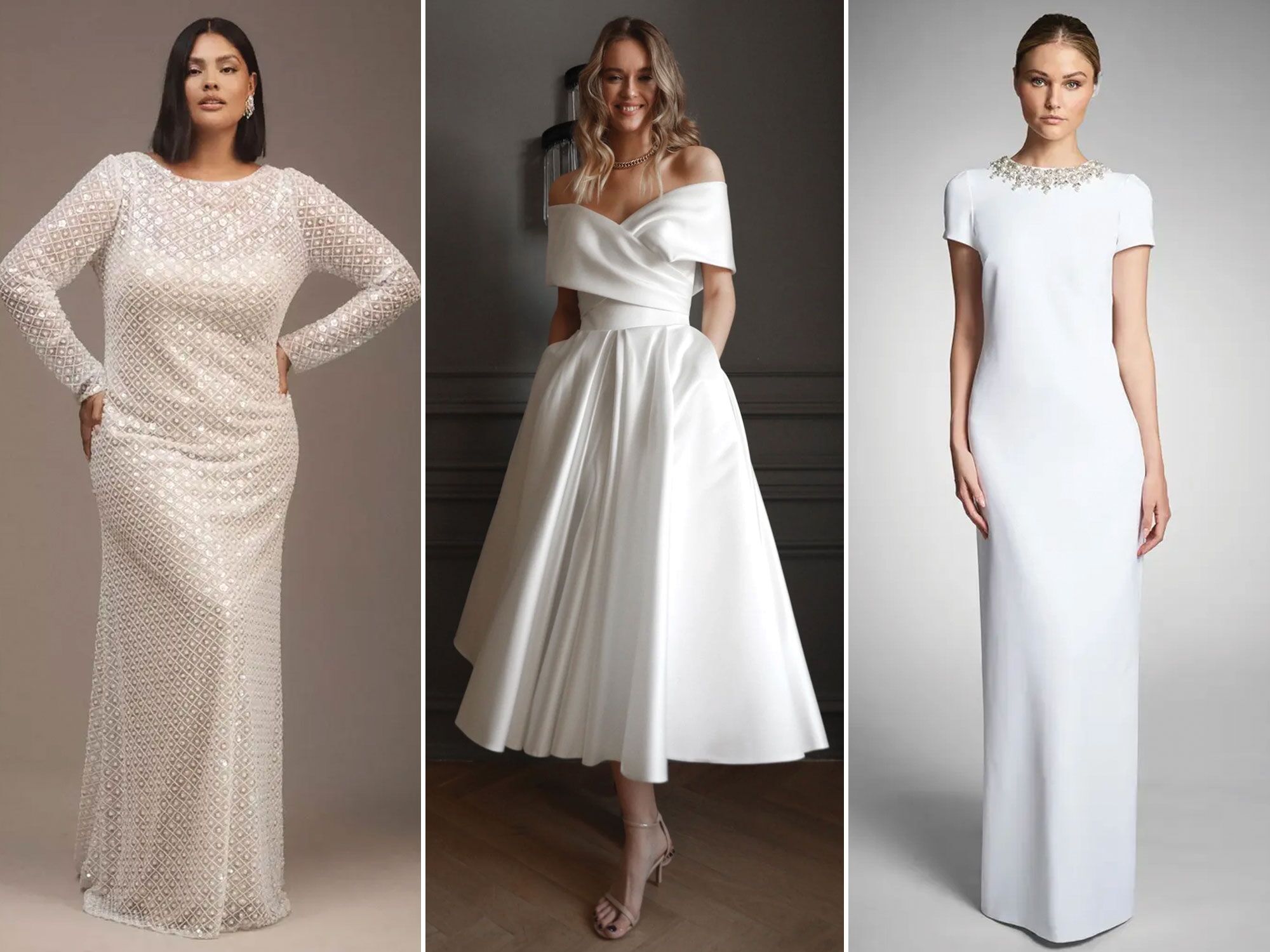
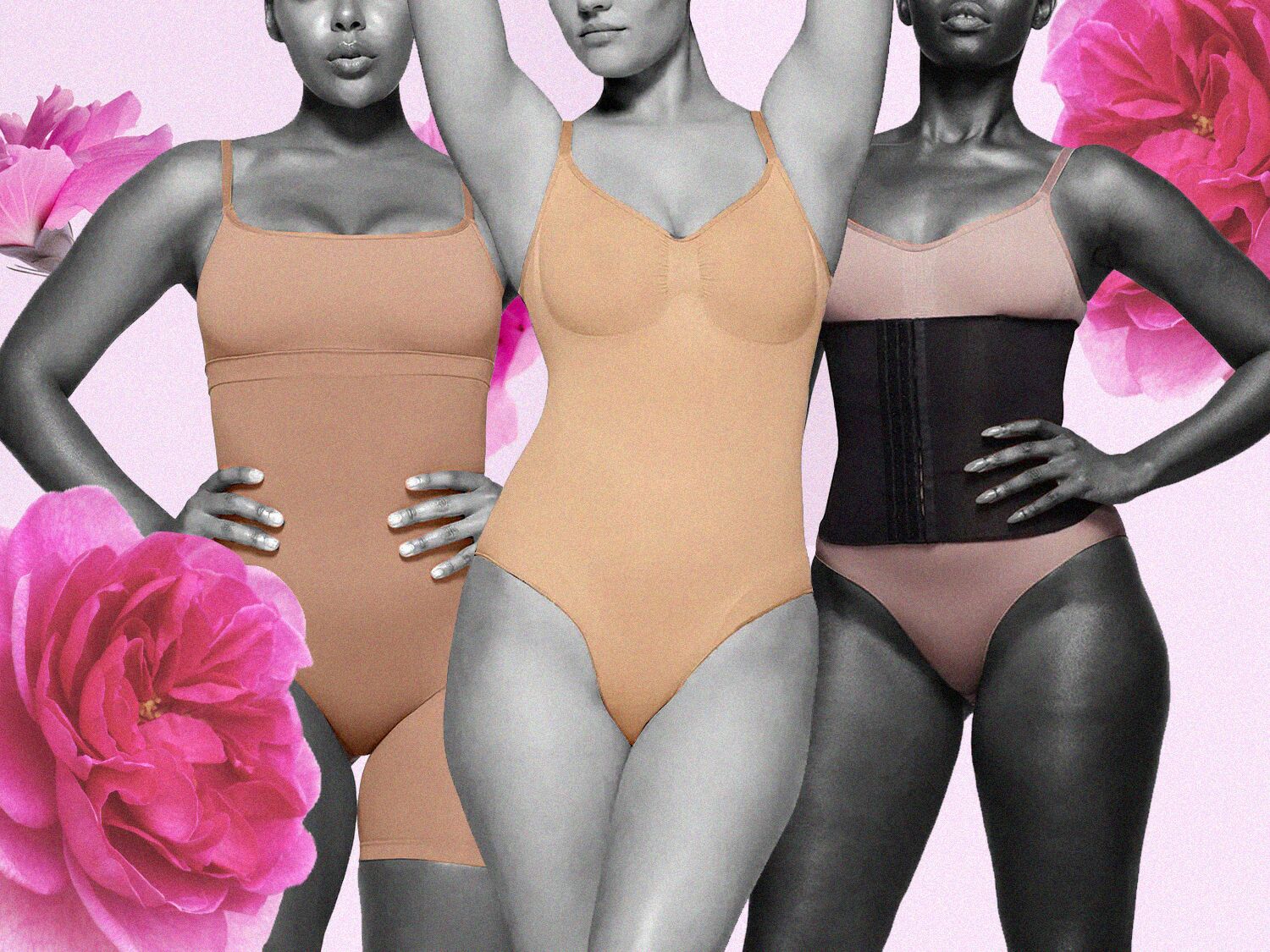
10. Is this dress practical for my wedding?
Before making your final decision, we recommend taking a few practical details into account. Ask your consultant how a potential style will affect your ability to sit, walk and use the restroom throughout your wedding day. If the stylist says the gown could be restricting and you're planning to be partying on the dance floor all night long, you might want to reconsider. Other things that can influence the practicality of a certain style are the wedding dress fabric, the train length and where you're getting married.
11. Does this dress have a bustle or detachable elements I should know about?
It's important to know if your dress has any convertible elements, such as a cape, skirt or bustle. (A bustle helps to lift and secure your train for easier movement during the reception.) If your dress has any of these, be sure to have your stylist show you how to properly use them. Pro tip: If you're planning on wearing a convertible wedding dress, we highly recommend bringing a parent, bridesmaid or trusted friend to your fittings so they can learn how the elements work as well. You'll appreciate the extra help when you're getting ready on your wedding day.
12. Does this dress come in other colors?
Did you know that white and ivory aren't the only options when it comes to your wedding dress color? Black wedding dresses and even colorful wedding dresses have been becoming more and more popular. If you're on the search for an unconventional look, be sure to ask your stylist about options in other colors.
13. Can this dress be customized?
Before you make a final decision about a gown, you should know if you can change its construction, color or fabric. It's possible to fall in love with a dress but dislike a few minor things about it, and the good news is that it can sometimes be changed. In some cases, you might even be able to make major dress alterations, like adding sleeves or wedding dress embellishments. If not, it's still a good idea to ask the question, since it can help guide your stylist toward another dress that's more suited for your needs.
14. Can I buy the sample?
"A sample gown is a dress that has been tried on in-store by brides before placing an order," says Katherine Tash, creative director and founder of Katherine Tash Bridal. "If a bride is looking for a designer dress at a lower cost or one with a shorter turnaround time, an off-the-rack sample gown or sample sale gown can be a great option," she explains. Be sure to discuss all available options with your bridal consultant.
15. If I don't buy this dress today, how long will it be available?
If you need some time to sleep on your decision, that's completely normal—just make sure your dress will still be available in the future. Designers discontinue styles all the time, and salons usually have very little notice. Some salons also offer incentives if you buy on your first visit. It never hurts to ask how long a dress will be available. (It might help you make up your mind by realizing that you don't want to miss out on a specific style.)
16. What undergarments do you recommend with this dress?
After you've found your dress, you'll need to consider what goes under it, which can impact the overall look just as much as the gown itself. Depending on the construction of your dress, you may be able to add bra cups and boning during your fittings. What is the benefit of these alterations? They'll save you the time spent searching for the right bridal shapewear, strapless bra or nude undergarments. You also don't need the heat or bulk of extra garments if you can avoid it.
17. What shoes and accessories would complement this dress?
This question gives your consultant an opportunity to style your dress in ways you might not have considered. They can share what the best shoes to pair with your dress might be. They can also make suggestions about wedding dress accessories based on what worked for previous brides who wore the same dress. Our advice? Keep an open mind. Oh, and be sure to start the conversation about shoes and accessories early. More elaborate orders, like custom headpieces or sashes, take longer to arrive.
18. Does a veil go well with this dress, and if so, what style?
Veil or no veil? That's the question every bride will face while shopping for their attire. The truth is that some dresses look best when paired with a particular veil style. Others look best with no veil at all. While the decision ultimately comes down to your personal preference, it can be helpful to have a discussion with your bridal consultant to see what they recommend.
19. How do I put on my wedding dress?
It may sound like a silly question, but if you have a dress with interior buttons, a lace-up back or an elaborate skirt that needs a bustle, you'll want to ask how to put it on properly to save time and avoid a wardrobe malfunction on your wedding day. Have someone who will be getting ready with you on the wedding day (like a relative or bridesmaid) attend your fittings to take notes on how to help you get dressed.
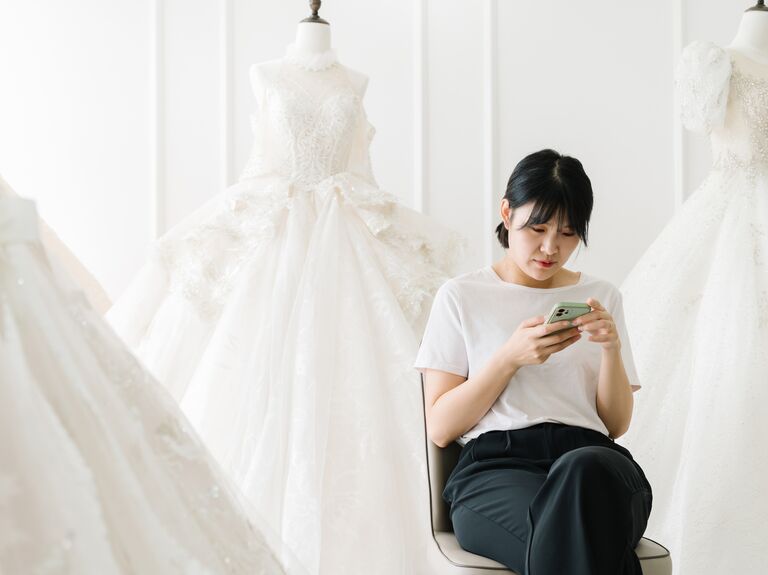
What to Ask After the Wedding Dress Appointment
Now, this is what they don't show you on TV. Once you've celebrated finding your dress, there are a few logistical loose ends you need to address before you sign the dotted line and hand over your credit card. These questions not only help you understand the bridal salon's payment policy but also set expectations for what to expect when your dress arrives.
20. What if I change my mind about my dress?
It's important to understand the return policy of the bridal salon you're purchasing your dress from in the event that you experience wedding dress regret. Wedding gowns are usually custom orders, so most stores won't give you a refund, but it's always a smart idea to check. There's a chance you may be able to recoup some of the cost or work out another option with the salon.
21. When is my balance due? Do you offer payment plans?
Each salon has a different expectation when it comes to payment, so you'll need to be clear on when the full balance of your dress is due. Some stores require a total payment up front, while others expect a deposit at the end of your appointment, with the remaining balance due when your dress arrives. Make sure you know all the details to avoid confusion—and so you can budget accordingly.
22. What is the expected turnaround time for my wedding dress?
The turnaround time for your dress refers to the time frame between your bridal appointment and when you can expect to receive your gown. This time frame can vary depending on factors such as the complexity of alterations and the availability of materials. Asking the salon about the estimated turnaround time will help you plan your wedding-related tasks, including scheduling additional fittings or alterations.
23. Will the dress be steamed at pick-up?
It's an easy step to forget, but trust us: You don't want to walk down the aisle in a wrinkled gown. If your dress won't be steamed when it's ready to pick up, bring a steamer on your wedding day or ask if your venue is able to provide one (they might have a steamer on hand in the dressing suites). If you're having the dress altered by a seamstress who operates separately from your bridal salon, you should also ask if your dress will be steamed or pressed ahead of time.
24. What's the best way for me to transport and store my gown?
Your dress will most likely be pressed and packed when you pick it up, either from your salon or the seamstress. Once it's in your possession, you should know how to store it and transport it to your venue. If you're storing it outside of the salon, keep it in a protective opaque garment bag—not only to avoid your partner from sneaking a peek, but also to protect it from sunlight and discoloration. If you're having a destination wedding, travel with your dress in a garment bag (preferably as a carry-on, so you have it in your sight) and steam it once you arrive.
25. Do you offer wedding dress cleaning or preservation services?
Many bridal salons offer wedding dress preservation services, which can help you keep your gown in pristine condition for years to come. Wedding dress preservation involves professionally cleaning and packaging your dress to protect it from yellowing, stains, and other damage. It's a great way to safeguard your cherished memories. Ask the salon if they provide this service or if they can recommend a trusted preservation specialist.
Additional reporting by Sofia Deeb.

